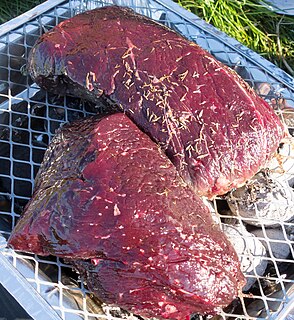Frontline is the flagship investigative journalism program of the Public Broadcasting Service (PBS), producing in-depth documentaries on a variety of domestic and international stories and issues, and broadcasting them on air and online. Produced at WGBH-TV in Boston, Massachusetts, and distributed through PBS in the United States, the critically acclaimed program has received every major award in broadcast journalism. Its investigations have helped breathe new life into terrorism cold cases, freed innocent people from jail, prompted U.N. resolutions, and spurred both policy and social change.
Nova is an American popular science television series produced by WGBH Boston. It is broadcast on PBS in the U.S., and in more than 100 other countries. The series has won many major television awards.
Buckminster Fuller: Thinking Out Loud (1996) is a PBS American Masters documentary on the inventor, visionary, and thinker R. Buckminster Fuller produced and directed by Academy Award nominees Karen Goodman and Kirk Simon. Cinematography by Buddy Squires, edited by Sara Fishko, and a production of Simon & Goodman Picture Company.

Arena is a British television documentary series, made and broadcast by the BBC since 1 October 1975. Voted by TV executives in Broadcast magazine as one of the top 50 most influential programmes of all time, it has produced over six hundred episodes directed by, among others, Frederick Baker, Jana Boková, Jonathan Demme, Nigel Finch, Mary Harron, Vikram Jayanti, Vivian Kubrick, Paul Lee, Adam Low, James Marsh, Leslie Megahey, Volker Schlondorff, Martin Scorsese, Julian Temple, Anthony Wall, Leslie Woodhead, and Alan Yentob.

Natural World is a strand of British wildlife documentary programmes broadcast on BBC Two and BBC Two HD and regarded by the BBC as its flagship natural history series. It is the longest-running documentary in its genre on British television, with nearly 500 episodes broadcast since its inception in 1983. Natural World programmes are typically one-off films that take an in-depth look at particular natural history events, stories or subjects from around the globe.

Miles O'Brien is an independent American broadcast news journalist specializing in science, technology, and aerospace who has been serving as national science correspondent for PBS NewsHour since 2010.
The British Academy Television Awards, also known as the BAFTA TV Awards, are presented in an annual award show hosted by the British Academy of Film and Television Arts (BAFTA). They have been awarded annually since 1955.

A natural history film or wildlife film is a documentary film about animals, plants, or other non-human living creatures, usually concentrating on film taken in their natural habitat but also often including footage of trained and captive animals. Sometimes they are about wild animals, plants, or ecosystems in relationship to human beings. Such programmes are most frequently made for television, particularly for public broadcasting channels, but some are also made for the cinema medium. The proliferation of this genre occurred almost simultaneously alongside the production of similar television series.
David Hickman has been writing, producing and directing single documentaries and series for broadcast television in the United Kingdom and internationally for the last twenty years. He is also a cinematographer, having worked on 16 and 35mm film, as well as a variety of video and HD formats – shooting drama and non-fiction.
David Belton is a director, writer, and film producer. His experiences as a BBC reporter covering the 1994 Rwandan Genocide led him to write the original story and produce the film Shooting Dogs, directed by Michael Caton-Jones, which dramatizes the events at the Ecole Technique Officielle. It was retitled Beyond the Gates for its 2007 U.S. release. He has directed documentaries and drama-documentaries and documentaries for PBS and dramas for the BBC. His book, When the Hills Ask for Your Blood was published in January 2014 by Doubleday.

Q.E.D. was the name of a strand of BBC popular science documentary films which aired in the United Kingdom from 1982 to 1999.

A television show is any content produced for broadcast via over-the-air, satellite, cable, or internet and typically viewed on a television set, excluding breaking news, advertisements, or trailers that are typically placed between shows. Television shows are most often scheduled well ahead of time and appear on electronic guides or other TV listings.

Sherlock is a British crime drama television series based on Sir Arthur Conan Doyle's Sherlock Holmes detective stories. Created by Steven Moffat and Mark Gatiss, it stars Benedict Cumberbatch as Sherlock Holmes and Martin Freeman as Doctor John Watson. Thirteen episodes have been produced, with four three-part series airing from 2010 to 2017, and a special episode that aired on 1 January 2016. The series is set in the present day, while the one-off special features a Victorian period fantasy resembling the original Holmes stories. Sherlock is produced by the British network BBC, along with Hartswood Films, with Moffat, Gatiss, Sue Vertue and Rebecca Eaton serving as executive producers. The series is supported by the American station WGBH-TV Boston for its Masterpiece anthology series on PBS, where it also airs in the United States. The series is primarily filmed in Cardiff, Wales, with North Gower Street in London used for exterior shots of Holmes and Watson's 221B Baker Street residence.
Michael Mosley is a British television journalist, producer and presenter who has worked for the BBC since 1985. He is probably best known as a presenter of television programmes on biology and medicine and his regular appearances on The One Show.
Jeanne Jordan is an American independent director, producer and editor. She was nominated for an Academy Award and has received the Grand Jury Prize at the Sundance Film Festival among many other awards.
Steven Ascher is an American independent director, producer and writer. He was nominated for an Academy Award and has received the Grand Jury Prize at the Sundance Film Festival among many other awards.
"The Miracle of Life" was an episode produced by Nova about the human reproductive process. The episode won multiple awards including a Peabody and an Emmy. Photographed by Lennart Nilsson, the program was originally aired in Sweden as "The Saga of Life." The BBC acquired the episode for the documentary series Horizon and aired it on October 11, 1982. The original Swedish version was broadcast on November 25, 1982. Many scenes were edited, and the intro in both versions, are different, as well as the scene where the baby was born.
Doctor Who: Thirty Years in the TARDIS is a one-off, 50-minute television documentary, broadcast to celebrate the thirtieth anniversary of the science-fiction series Doctor Who. It was originally transmitted on Monday 29 November 1993, on BBC One.
Argonon is an independent media group founded in 2011 by CEO James Burstall, the CEO of Leopard Films. With offices in London, Manchester, Bristol, Glasgow, New York and Vancouver. Argonon was named the fourth biggest UK owner/consolidator in the Broadcast Indie Survey 2015 and 12th global consolidator in Broadcast Indie 2017.















